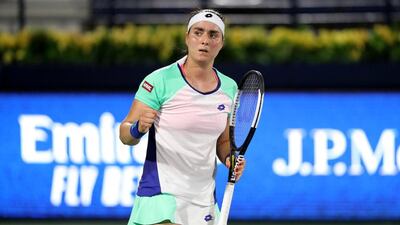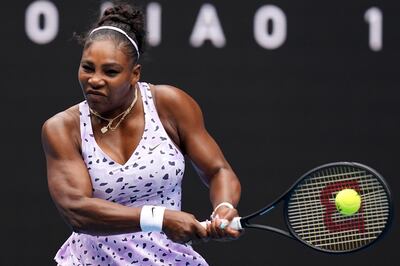The WTA tour is scheduled to restart in two weeks’ time with its chiefs well aware of the cloud of risk and uncertainty surrounding its mid-pandemic resumption.
A five-month hiatus will come to an end on August 3 when a host of players – including headliner Simona Halep – touchdown in Palermo for the first WTA event on the calendar since tournaments in Lyon and Monterrey concluded on March 8.
While several sports leagues and competitions have managed to restart across the globe, tennis faces a unique set of challenges due to the fact that it does not take place in just one location or within one country, but it requires players to travel around the world on a weekly basis.
Tennis during coronavirus times doesn’t just need a sports bubble, it needs a travelling sports bubble.
Different governments have set different travel restrictions that may prevent players from making it to specific tournaments, while some players do not feel comfortable getting on a plane and going abroad during such turbulent times.
Others are eager to get back on court and want to make use of the earning opportunities made available to them, instead of going through the rest of the season without making any money.
The decision to bring back the tennis tour is understandably a divisive one, but WTA CEO Steve Simon believes it was a call that needed to be made.
"These are not normal times and what you're trying to do is operate in a world that is imperfect right now and try to find whatever levels of fairness and opportunity you can in a very imperfect situation," Simon told The National in a video call.
In an attempt to relieve some of the pressure off of the players, the WTA revised its ranking system to ensure no one would drop any points through the rest of the year. If a player opts out of playing a certain week, she would not lose the points accumulated in that same week last season. If a player chooses to compete in a tournament, only the better performance from her 2019 or 2020 participation would count towards her ranking.
“There’s a ‘better of’ system, so it’s not going to create great volatility in the rankings in the year ahead,” explained Simon.
Mitigating risks
Initially, the WTA did not want to resume until everyone had the ability to play, but Simon admits they had to adjust their way of thinking as the situation with the virus continued to evolve around the world. Instead of looking at a complete washout for the rest of the season, the tour decided that some degree of tennis is better than no tennis at all.
The main goal, according to Simon, is to provide as many job opportunities as possible while mitigating the risks.
“We still have a lot of issues, with quarantine, this is going to be an ongoing issue the rest of the year,” said the WTA chief.
“Everything week to week is provisional right now, but we got to the point that we should try to do as much as we can, and use this year as a learning test; how are we going to live with this virus, and how are we going to begin to operate moving forward, because this is not going away tomorrow.
“And we have to figure out how to move forward, with the same point of keeping everybody safe; because if you’re looking for normalcy, you probably won’t see that until 2022, and that’s a long time away.
"And we have to try to provide income opportunities for our athletes, our tournaments, to keep them viable. You don’t want to lose your sponsors, you don’t want to lose your broadcast partners, you have to try to work within this new environment in as safe a way as you can.”

Several high-profile players have already announced their commitment to certain tournaments. Serena Williams is scheduled to play in the inaugural WTA event in Kentucky (starts August 10) as well as the US Open in New York (starts August 31), while Romanian world No 2 Halep is slated to be top seed in Palermo.
Canadian Bianca Andreescu has expressed her intention to defend her US Open title but two-time Wimbledon champion Petra Kvitova told BBC 5 Live a few days ago that she wasn't sure if she would make the trip to New York City.
Arab No 1 Ons Jabeur, whose fine form early this season has taken her to a career-high 39 in the world, is hoping to play three events in the United States next month. The Tunisian is unsure, however, how she’ll be able to do that from a logistical perspective.
Government restrictions
"To be honest I think it's too soon to start tournaments again. Basically the tournaments in Palermo and Prague, for the girls in Europe, they could travel, but the ones outside Europe they cannot go, because of quarantine, because of the different restrictions for each government," Jabeur told The National.
“So what they’re saying is, if we cannot travel, then basically it doesn’t matter, they have to do the tournament, they have to restart playing tennis, which for me, it’s still not safe and I don’t know how they’re going to do this.
“For example for me, I chose to play Lexington, Cincinnati in New York and US Open, and I still have no idea how I’m going to travel there, I have no idea what the government restrictions are there, they change every two days.
“If I enter these tournaments, and I cannot play them, I don’t think the WTA can do anything for me.
“I don’t think it’s fair enough with the new ranking system because personally I want to improve on what I did from last year. I was playing really good at the beginning of the year so obviously I want to continue and I have a long-term plan to achieve a lot of things.
"Plus we’re talking about Grand Slams here, I don’t want to waste any Grand Slams. I’m sure it’s the same situation for other players. I don’t really like this idea and it’s still not fair to come back to play yet.”
Players have been debating the topic on social media in recent weeks, with many finding themselves at opposite ends of the argument.
Australian world No 132 Priscilla Hon is concerned about the high number of coronavirus cases reported each day in the United States, while her compatriot, former top-20 player Daria Gavrilova is grateful for the playing opportunity.
“As much as I want to play the US Open. When US are getting 60,000 cases a day still... how is this still going ahead!?” Hon said on Twitter.
Gavrilova responded: “We have a choice. Personally I like to know that I have an opportunity to play and earn. But I feel like the players just don’t want to make a tough decision and maybe would feel a relief if the tournament is cancelled.”
Some lower-ranked players, who typically compete on the ITF circuit, are lamenting the fact that the WTA will restart two weeks earlier than the ITF.
Three women’s Futures tournaments, in Belgium, Portugal and Tunisia, are scheduled for the week of August 17, and kick-off the resumption of the ITF tour.
Simon notes that the ITF have worked hard to salvage more than 80 tournaments until the rest of the year, and explains how the return of top-tier tennis is essential to keeping the sport viable.
Indeed, what would be the point of an ITF tour if there is no WTA circuit to feed into? It makes sense to prioritise the highest level of the tennis, because that’s how the money gets funnelled into the sport.
“The risk that you run is if you don’t operate, these numbers [of tournaments] could even fall down further because of the economic realities that are going to come with sports in general,” said Simon.
“So yes, their arguments are fair, there aren’t as many jobs, but there’s been a tremendous effort to produce an awful lot of jobs, and I think it gives us the best opportunity forward, in a very imperfect situation we’re all dealing with right now.
“Everybody is working as hard as they can and the fact that we have this many people that are still willing to invest in our sport and our athletes, in this environment, when you don’t have fans and you don’t have some of the revenue opportunities, so the business model doesn’t make sense, I think they deserve an awful lot of credit.”
One part of the WTA’s provisional calendar that remains in serious jeopardy is the Asian swing. China recently announced there would be no international sports events staged there in 2020, which could mean major tournaments like the China Open and the tour’s season-closing showpiece, the WTA Finals in Shenzhen, might be cancelled this year.
“I think we’ll know next two weeks whether we’ll be able to play in China or not. We certainly hope that we do. We’ve had conversations with the governmental entities within China and they’re obviously looking at a much bigger picture than just tennis, which we have to respect and we do respect. I don’t know whether we’ll be there or not, I think it’s 50-50 right now,” Simon stated.
Mandatory quarantines
The uncertainty is not just about the Asian swing. The feasibility of having a tennis tour with the pandemic still raging in certain areas is still unknown, and if things don’t go well early on, the whole calendar might be scrapped at any given moment.
Figuring out testing and mandatory quarantines for players looking to contest tournaments in back-to-back weeks sounds like a logistical nightmare and would likely discourage them from competing at all.
“We’re going into this with eyes wide open and we’re not going to hesitate to shut it down if we find that we cannot manage it or having too many illnesses and we can’t get the athletes to travel. We’re not going to move forward for the sake of moving forward, it’s got to work,” added Simon.
“And the only way you’re going to know if it’s going to work is to try it, and to trial it. So we have three events to start the year [Palermo, Prague and Kentucky], which we’re going to do irrespective of any decisions that are made. We’re going to evaluate those and then we will determine how the rest of the year progresses.
“We have to deal with common sense, and people can question common sense that you’re even operating these days, but I think we have to try.”
While the efforts put in by the WTA and its partners to bring back tennis are undoubtedly admirable, it is hard to imagine a successful outcome with so much travel required and the mounting roadblocks along the way.
Perhaps we’ll end up with mini regional tours scattered around the globe, with players competing in the events that are closest to or most accessible from their home bases. Or maybe the whole experiment will ultimately prove too difficult to pull off.
Either way, professional tennis as we know it will not be the same for the foreseeable future.




